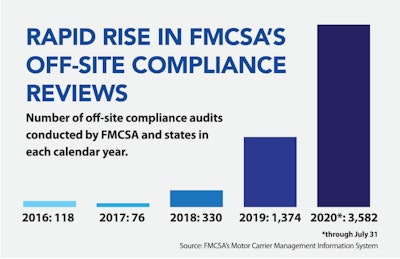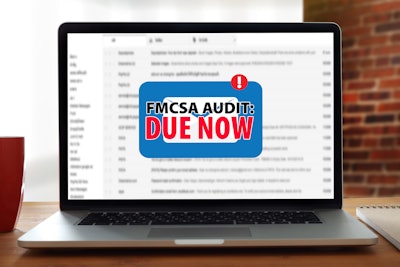 The total number of compliance audits conducted by FMCSA has kept pace with the prior four calendar years. However, the number of offsite audits has risen dramatically under the COVID-19 pandemic and a corresponding waiver issued in May by FMCSA. (Graphic by Richard Street)
The total number of compliance audits conducted by FMCSA has kept pace with the prior four calendar years. However, the number of offsite audits has risen dramatically under the COVID-19 pandemic and a corresponding waiver issued in May by FMCSA. (Graphic by Richard Street)Leveraging new authority granted as part of the federal government’s COVID-19 emergency declaration, the Federal Motor Carrier Safety Administration this year has ramped up its offsite compliance reviews of motor carriers’ records and safety practices.
The agency in May issued pandemic-related regulatory guidance that allows offsite audits to determine carriers safety ratings — Satisfactory, Conditional or Unsatisfactory. Previously, regulations required FMCSA to conduct an onsite compliance review to issue an Unsatisfactory rating. That change has allowed the agency to conduct comprehensive safety reviews of fleets remotely instead of in-person, leading to the spike in offsite audits.
“It’s a new twist,” said Lesley Sachs, a partner at the national transportation-focused law firm Taylor & Associates, based in Winter Haven, Florida. “Carriers need to pay attention. It’s something to take seriously. The opportunity presented itself with COVID, and FMCSA seized it.”
According to data from its Motor Carrier Management Information System, the agency and its state enforcement partners conducted 3,582 offsite compliance reviews through the end of July — nearly three times the number of offsite safety audits conducted in the full 2019 calendar year, 1,374. In 2017, just 76 offsite compliance reviews were conducted, and 330 were conducted in 2018, according to FMCSA data.
That 3,582 is more than half of the 6,942 total reviews conducted this year through July 31.
 Safety auditors, whether from FMCSA or a state office, will ping carriers with an email letting them know an investigation is underway. Carriers can follow-up with the department to verify the audit is legitimate. Turn-around times on investigators’ request for fleet records is often swift — just a week. “It’s typically a really short process,” said attorney Lesley Sachs. “The whole thing is wrapped up from start to finish within two weeks.”
Safety auditors, whether from FMCSA or a state office, will ping carriers with an email letting them know an investigation is underway. Carriers can follow-up with the department to verify the audit is legitimate. Turn-around times on investigators’ request for fleet records is often swift — just a week. “It’s typically a really short process,” said attorney Lesley Sachs. “The whole thing is wrapped up from start to finish within two weeks.”If that trend holds this year, FMCSA and state enforcers will have conducted nearly 6,175 remote offsite inspections by yearend — more than five times as many as last year ‚ and more than half of the on-pace-for 12,000 compliance reviews. Last year, just 10% of total compliance reviews conducted by FMCSA and state partners were offsite.
“It was certainly already a trend,” said Daren Hansen, a senior transportation safety consultant for J.J. Keller. “Now, the pandemic shot those numbers up.”
With those increased numbers has come an expansion in the scope of offsite reviews, said Brandon Wiseman, a partner for Scopelitis, Garvin, Light, Hanson & Feary. “Historically, offsite audits were almost always used for what are known as focused audits,” he said, and not to conduct comprehensive compliance reviews.
It’s unclear what percentage of this year’s offsite audits have been comprehensive, and FMCSA has not broken those statistics out like it does for onsite reviews. But the consensus is clear: The agency is leaning on offsite reviews to conduct comprehensive audits in place of onsite reviews.
Because of the expansion in scope of offsite audits, investigators are asking carriers to produce more records and documents than they typically would for an offsite review. Likewise, FMCSA is including reviews of equipment maintenance, said Sachs, which typically is reserved exclusively for onsite reviews. That includes documents like maintenance records and driver vehicle inspection reports, among other equipment-related documentation.
Dave Osiecki, president and chief executive officer for Scopelitis Transportation Consulting, said an offsite audit focused on hours of service compliance or drug/alcohol testing normally would ask for a small sample of records, such as three driver files or three drivers’ electronic logging device records from the past six months. With the new trend toward offsite comprehensive reviews, however, auditors instead are asking for a more sweeping sample of records.
Those records often must be turned in within a week, Sachs said. Investigators, either from FMCSA or a state DOT, will send an email to carriers notifying them of the pending investigation and requiring them to upload information such as accident records, driver lists, equipment lists, MC-90 forms and other records. They’re then often required to fill out a questionnaire with basic details such as revenue and mileage data, insurance information, addresses and other operational information.
After carriers upload the required information, the investigator will reach out via phone to complete the process. “They talk with the carrier about their compliance program and practices to get a feel for how robust and developed the compliance program is for that carrier,” Sachs said. After all that, “they issue a report to identify any acute or critical violations to address.”
Or, in the case of a safety rating of Conditional or Unsatisfactory being issued, carriers then have the usual 60 days (or 45, in the case of hazmat haulers) to file a corrective action plan or an appeal with FMCSA. Sachs said she’s seen offsite audits take place quickly — all wrapping up within just two weeks, typically.
That means carriers must have their documents and records organized should they face a compliance review, Osiecki said. “Do you know where your files are? Are they in a place where you can access them? Can you access them within 48 hours?”
Being disorganized or unable to produce requested documents is likely a fast-track to being hit with a Conditional safety rating, Wiseman said. “If an auditor comes in and asks for all of these files, and you don’t have them or just have them thrown in a box where an auditor has to build the files for you, that’s not going to bode well,” he said.
Like most other compliance reviews over the past decade, FMCSA uses carriers’ percentile rankings within the Compliance, Safety, Accountability (CSA) program to target fleets for safety audits.
To ward off audits in the first place, Hansen suggested regularly checking CSA scores. “Log in and review your data,” he said. “Look at trends. Review any data that can be reviewed. Take advantage of the crash accountability program, and have crashes that are clearly not preventable removed. Take steps to address what violations you can to keep your scores down.”
“Use the [Safety Measurement System] to know where you stand and work on improving those scores to get out of the crosshairs to begin with,” Wiseman said.












